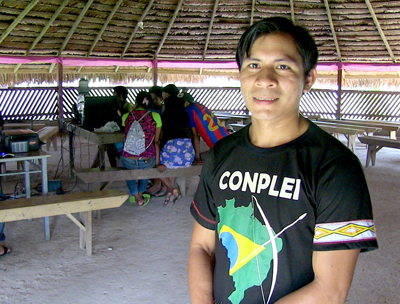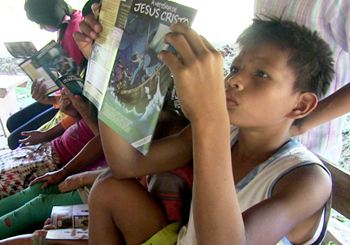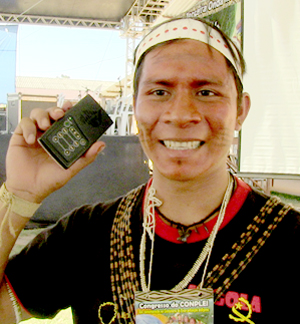 |
| Shapu shows teeth marks from where a jaguar bit his head, fracturing his skull and nearly killing him. |
(Nov. 23, 2012 - by Harold Goerzen) Terrified, the father ran to his son, Shapu Meo, just after a jaguar had lunged through the Amazon rainforest and attacked the young man.
"Jaguars always go for the head, and so within moments he was rolling around as the jaguar tore at his scalp, fracturing his skull," explained Larry Buckman, recounting the incident as described by Shapu who lives in northwestern Brazil. An HCJB Global missionary, Buckman represents Corrientes, a missions mentoring initiative for people from the developing world. It was launched by HCJB Global and other entities in Ecuador three years ago.
By the time the father shot an arrow into the jaguar, Shapu was already bleeding profusely. With no medical help in the village, he took his chances at meeting a canoe on the banks of the Javari River, a major tributary of the Amazon. Soon a dugout canoe with a small outboard engine came by, and the owner picked up the two men.
 |
| Shapu wearing a T-shirt from the Native Indian Congress 2012 at the Ammi Training Center in Chapada, Brazil, July 18-22. |
Just 20 years old, Shapu had been handpicked by his Matis tribe to be educated in Portuguese in the city of Tabatinga because of his intelligence and natural linguistic abilities. He is fluent in all five tribal languages spoken in the area where he grew up.
For seven days and nights in August 2011, the Indians pushed along the Javari River which serves as the border between Brazil and Peru. By the time they finally reached the hospital in Tabatinga, Shapu had almost bled to death and his body was burning up with fever due to infection.
"The hospital staff gave him little hope for recovery because of the infection and because his spinal fluid was leaking," recounted Buckman. "From the teeth marks on both sides of his forehead, you could see where the jaguar had grabbed him with his jaws."
Word about the attack and the men's long journey quickly spread through the community. When Marcos Mayoruna, a missionary from a neighboring tribe, heard the story, he rushed to the hospital to see if he could help the young patient.
 |
| Children eagerly read a Portuguese version of The Story of Jesus. |
"He prayed over the boy, and God began to heal him," Buckman said. "The missionary found out that Shapu's interest was education, so he invited him to stay at the ministry's discipleship with nine other young men from different tribes. There both Shapu and his dad heard the gospel and accepted Christ a few days later."
The more Shapu learned about the Bible, the more determined he was to take the gospel back to his own people. When Buckman arranged for HCJB Global to hold an audio production and computer seminar in the area, his interest in using technology to spread the gospel only grew.
"When I first met Shapu in Tabatinga in October 2011, his head was already healed, and I showed him the Messenger, an MP3-like solar player distributed by In Touch Ministries," Buckman continued. "He realized this was a tool that he could use to reach his tribe and many others."
While taking the course, Shapu was also introduced to the Portuguese versions of two books, The Action Bible and The Story of Jesus, and he became one of the first to begin translating the latter into the Matis language.
 |
| Shapu displays the Messenger, an MP3-like audio player that contains many hours of programming. |
"As we interviewed Shapu later, he related to us that he speaks five indigenous languages spoken in the Javari Valley, one of the most protected reservations in Brazil," Buckman shared. "They have government officials and police are stationed two days upriver, making sure that no outsiders or indigenous missionaries outside the reservation enter the area."
Buckman said Brazilian political leaders are afraid that if remote tribal groups convert to Christianity, it would change their culture, dampening the enthusiasm of tourists who want to see the natives in their natural state.
"But as Shapu looked over the Messenger and The Action Bible, he realized that no law in Brazil could stop these two oral messengers from going into the tribes," Buckman said.
The studio in Ticuna territory where tribal members study has become the hub for producing audio programs in at least five languages: Campe, Ticuna, Mayoruna, Matis and Marúbo.
"Right now they're raising funds for another dugout canoe and motor to take these young men back upriver for Christmas break and the New Year holiday, and they've started recording," Buckman related. "These indigenous believers have the vision to evangelize their own people, and Shapu is God's man to reach this protected area of Brazil."
He described the young indigenous evangelists as the "third wave of missionaries. My parents, who served for years in Brazil, were part of the first wave. I'm part of the second wave, and the indigenous people make up the third wave."
"We as white missionaries will never reach the unreached tribes," concluded Buckman. "For one thing, there aren't enough of us, and we don't speak the languages. It's a calling that we as missionaries cannot fulfill in ourselves, but God has placed us there to empower others."
Source: HCJB Global
Photo credits: Larry Buckman, thinkquest.org
